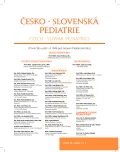Temperament in early childhood and its description using IBQR VSF
Authors:
M. Potměšil 1; P. Potměšilová 2
Authors‘ workplace:
Ústav speciálněpedagogických studií PdF UP, Olomouc
1; Katedra křesťanské výchovy CMTF UP, Olomouc
2
Published in:
Čes-slov Pediat 2017; 72 (4): 240-244.
Category:
Original Papers
Overview
Objective:
To develop a functioning Czech language-based IBQR VSF (The Infant Behavior Questionnaire-Revised – Very Short Form) as a tool to describe the child’s temperament during the period of the age of 3–12 months.
Background:
The child’s temperament is considered as a relevant personal variable in child developmental pathways. The purpose of the adaptation process was to translate and modify the Czech version of the temperament assessment instrument – IBQR VSF – based on Rothbart’s theoretical approach.
Methods:
An original translation was modified, based on feedback by professional translators, three bilingual psychologists, and a sample of 15 Czech mothers. A back-translation by a professional translator was then assessed by the authors of the original (English language) instruments. For the final version of the measure, the authors of the original instrument judged that 100% of the items were consistent with the original items, and a second sample of 15 collaborating mothers identified no problems with the Czech items.
Results:
The reliability of the adapted questionnaire was verified by calculation of the Cronbach's alpha.
Conclusion:
The results obtained will be offered as the IBQR VSF functional tool to psychologists specializing in evaluating children in early age groups. We also expect interest on the part of specialists working with the parents of prematurely born or handicapped children.
KEY WORDS:
child, temperament, assessment, translation, modification
Sources
1. Rothbart MK, Ziaie H, O’Boyle C. Self-regulation and emotion in infancy. New Directions for Child and Adolescent Development 1992; (55): 7–23.
2. Rothbart MK. Temperament and the development of inhibited approach. Child Development 1988; 59 (5): 1241–1250.
3. Rothbart MK. Measurement of temperament in infancy. Child Development 1981; 52 (2): 569–578.
4. Putnam SP, Helbig AL, Gartstein MA, et al. Development and assessment of short and very short forms of the infant behavior questionnaire-revised. Journal of Personality Assessment 2014; 96 (4): 445–458.
5. Putnam SP, Gartstein MA, Rothbart MK. Measurement of fine-grained aspects of toddler temperament: The Early Childhood Behavior Questionnaire. Infant Behav Dev 2006; 29 (3): 386–401.
6. Gartstein MA, Rothbart MK. Studying infant temperament via the Revised Infant Behavior Questionnaire. Infant Behav Dev 2003; 26 (1): 64–86.
7. Ackerman D. The critical evaluation of the Viennese tests as applied to 200 New York infants six to twelve months old. Child Development 1942; 13 (1): 41–53.
8. Korner A. Reliable individual differences in preterm infants‘ excitation management. Child Development 1996; 67 (4): 1793–1805.
9. Gartstein M, Gonzalez C, Yang S, et al. Studying cross-cultural differences in the development of infant temperament: People‘s Republic of China, the United States of America, and Spain. Child Psychiatry & Human Development 2006; 37 (2): 145–161.
10. Klein VC, Putnam SP, Linhares MBM. Assessment of temperament in children: translation of instruments to Portuguese (Brazil) language. Interamerican Journal of Psychology 2009; 43 (3): 552–557.
11. Hague P, Jungmann V. Průzkum trhu: Příprava, výběr metod, provedení, interpretace výsledků. Brno: Computer Press, 2003 : 1–234.
12. Mareš P, Rabušic L, Soukup P. Explorační faktorová analýza. In: Analýza sociálněvědních dat [nejen] v SPSS. Brno: Masarykova univerzita, 2015 : 375–399.
13. Kazdin AE (ed). Methodological Issues and Strategies in Clinical Research. 4th ed. Washington, DC: American Psychological Association, 2016 : 495–512;
Labels
Neonatology Paediatrics General practitioner for children and adolescentsArticle was published in
Czech-Slovak Pediatrics

2017 Issue 4
- What Effect Can Be Expected from Limosilactobacillus reuteri in Mucositis and Peri-Implantitis?
- The Importance of Limosilactobacillus reuteri in Administration to Diabetics with Gingivitis
-
All articles in this issue
- Temperament in early childhood and its description using IBQR VSF
-
Infantile hemangiomas.
Current treatment procedures - Tolerogenic dendritic cells and their application in immunopathological processes
- Quality of life of pediatric patients with haemophilia in the Czech Republic – experiences of one centre
- Osteogenesis imperfecta – state of art
- Therapeutic strategies to optimize bone metabolism in anorexia nervosa
- Hypophosphatasia – skeletal disease requiring our attention
- Seasonal variability of vitamin D deficiency in patients with inflammatory bowel disease and other chronic diseases
- Czech-Slovak Pediatrics
- Journal archive
- Current issue
- About the journal
Most read in this issue
- Osteogenesis imperfecta – state of art
-
Infantile hemangiomas.
Current treatment procedures - Hypophosphatasia – skeletal disease requiring our attention
- Tolerogenic dendritic cells and their application in immunopathological processes
